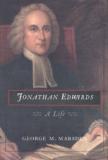A Towering Clergyman
A question that looms large for many Americans these days, after the second Persian Gulf war, is “How does a religion that claims universal and exclusive truth fit into a pluralistic environment?” Such is the question at the heart of George M. Marsden’s new work, Jonathan Edwards: A Life. By extension, one may ask, “What can Edwards’s life teach postmodern America, indeed the postmodern world, where religious strife simmers just under the surface and suicide bombings, as well as terrorism of many other kinds, explode with regularity?” Religious intolerance is not limited to variations on a theme within ecumenical Christian dialogue, but is found today in the way people of faith—Muslims, Jews and Christians—discuss the politics of religion on the world stage.
Jonathan Edwards reads much like a novel, filled with local color and cultural context as well as the internal drives and loves and blind spots of its subject. A first-rate historian and a professor at the University of Notre Dame, Marsden examines the large-scale forces at work in the world that shaped Edwards’s thought and with which he contended. Thus, whether the reader is an academic theologian, a cultural historian or a nonprofessional, this imaginative and sympathetic reading of Edwards’s life is informative and enjoyable.
As with good fiction, so good history looks into the heart of human dilemmas. By critically evaluating Edwards’s contribution to religion and culture in his time, Marsden provides us some tools with which to evaluate our pluralistic religious culture. He asks the question, “How did Edwards construct a life of profound faith and live it?” This is a question of synthesis, not merely analysis.
Marsden’s book is the first full, critical biography of this giant of American intellectual history since 1940. Many worthy biographies of Jonathan Edwards (1703-58) have appeared in the last 60 years, but Marsden’s alone is a fit companion piece to Yale University’s decades-long project on the writings of Edwards, The Works of Jonathan Edwards. To evaluate critically the extraordinarily dedicated life of faith as well as the thought of this brilliant 18th-century theologian is no small task. Marsden succeeds superbly.
Very early in the book, Marsden lays out the differences between Edwards’s early 18th-century Reformed Christian and evangelical world view and our own of the early 21st century. Edwards’s commitment to British hierarchical structures, rigid social classes and the enormous power of the Reformed clergy in British colonial America constituted the foundation of a complicated, intriguing and instructive life—not to mention a rigorous religious life. Often caricatured as passionless and stiff, the Jonathan Edwards who emerges from Marsden’s book—thanks to the author’s abundant historical detail and impeccable research—is passionate about his God and his family, and believes that nothing is more important to any human being than his or her eternal relationship to God.
Edwards was a man of immense personal integrity and, though disciplined, vulnerable to depression and in need of human care. His well-documented courtship and marriage to Sarah Pierpont provides an excellent illustration of that vulnerability—which so few biographers have captured—and balances the image of the fiery preacher of “Sinners in the Hands of an Angry God.” He also wrote a prose poem that testifies to his human passion for Sarah, but it is couched always in reverent and honest spiritual language. Marsden captures Edwards’s rigorous ordering of his loves in a most sympathetic and imaginative way, giving the reader a key to his handling of the larger, less pleasant struggles of his life and work.
With clarity and vigor, Marsden describes Edwards’s great lifelong battle against “creeping” Arminianism (Reformed doctrines that were critical of strict Calvinism and argued that human beings can choose to accept or resist God’s offer of salvation) and the gradual expansion of Anglicanism and other less rigorous Protestant confessions in the British colonies. Even at the height of the Great Awakening (circa 1742), at a time when the Reformed evangelical message was sweeping the colonies, Edwards was rather publicly modest in his response to the success of the movement. This reserve, too, as Marsden points out, was born of a well-ordered love for people because of God’s love for them.
[Edwards’s own] estimate of what was happening was a reflection of the intersection of his own experience, his theological vision, and the extraordinary events of the year. We must think of him as someone who was often so overwhelmed with the glory of God that he seemed to sense it directly.... Moreover, at the core of his vision of God was the beauty of God’s irrepressible love manifested in Christ. While he also expected continuing evil, or the horrors generated by rebellion against such wonderful good, his theology demanded a culmination of history in the triumph of universal love over hatred.
But love, human love, can be misguided. Edwards teaches our generation of believers about the great benefit of a thoroughly ordered set of loves, a disciplined and continuously re-evaluated method of investigating our truths and an ability to keep the “battles” of religion in the realm of vigorous dialogue and intense discernment, rather than expressed through terrorist bombings or crusades.
What has changed in the believing heart and mind in the 21st-century American is, of course, the priority of tolerance and reverence for faith traditions and expressions other than one’s own. Perhaps the challenge for the 21st-century American believer is to develop an ordered hierarchy of loves and disciplined passion for the knowledge of one’s religious heritage. With such love and knowledge, true dialogue and understanding can help us move beyond uneasy tolerance, which so easily breaks down and opens the way to violence.
This article also appeared in print, under the headline “A Towering Clergyman,” in the November 3, 2003, issue.








